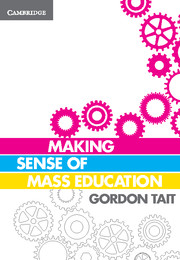Book contents
- Frontmatter
- Contents
- Acknowledgements
- INTRODUCTION
- PART 1 RE-ASSESSING THE THREE PILLARS: MODERN AND POSTMODERN SOCIOLOGIES OF EDUCATION
- PART 2 THE FOUNDATIONS OF AN ALTERNATIVE APPROACH: EDUCATION AND GOVERNANCE
- PART 3 CULTURAL CONTEXTS OF CONTEMPORARY EDUCATION
- PART 4 PHILOSOPHY AND MASS EDUCATION
- CHAPTER 10 PHILOSOPHY
- CHAPTER 11 ETHICS AND THE LAW
- CHAPTER 12 TRUTH AND POSTCOLONIALISM
- CONCLUSION
- References
- Index
CHAPTER 10 - PHILOSOPHY
from PART 4 - PHILOSOPHY AND MASS EDUCATION
- Frontmatter
- Contents
- Acknowledgements
- INTRODUCTION
- PART 1 RE-ASSESSING THE THREE PILLARS: MODERN AND POSTMODERN SOCIOLOGIES OF EDUCATION
- PART 2 THE FOUNDATIONS OF AN ALTERNATIVE APPROACH: EDUCATION AND GOVERNANCE
- PART 3 CULTURAL CONTEXTS OF CONTEMPORARY EDUCATION
- PART 4 PHILOSOPHY AND MASS EDUCATION
- CHAPTER 10 PHILOSOPHY
- CHAPTER 11 ETHICS AND THE LAW
- CHAPTER 12 TRUTH AND POSTCOLONIALISM
- CONCLUSION
- References
- Index
Summary
This chapter makes the case for the importance of philosophy, both as a discipline in its own right, and as a subject area vital to the better understanding of education. Philosophy is largely concerned with those areas of study and speculation beyond the reach of empirical analysis, addressing problems about how we construct knowledge, how we produce a just society, and how we determine ‘right’ from ‘wrong’. Its central research methodology is simply to think with clarity. The significance of this discipline has not been limited to answering abstract questions about the human condition; philosophy has been instrumental both in making us into rational and reflexive citizens, and also in framing the ideas behind our entire system of mass schooling.
Myth #1 Philosophy has no place in the twenty-first-century curriculum
We don't have the space in the curriculum to teach philosophy. School children need to study subjects that will actually get them a job.
The study of philosophy brings with it many benefits within mass schooling, benefits that extend far beyond the directly instrumental: the ability to think clearly and logically, an overall improvement in academic performance, and a greater sensitivity to social and ethical issues, not to mention the capacity to address essential questions about the human condition.
Myth #2 ‘Education’ is self-evident; we don't need philosophy to explain it
We all know what education is. There isn't really any disagreement, or any confounding complexity – those with knowledge, pass it on to those without.
Actually, there’s a lot of disagreement over what education is, and how it ought to work in practice. By better understanding how philosophical approaches like idealism, realism, romanticism, pragmatism, Marxism, and postmodernism continue to shape our education system, we can better grasp the range of educational possibilities, as well as fashion our own teaching philosophies.
- Type
- Chapter
- Information
- Making Sense of Mass Education , pp. 207 - 226Publisher: Cambridge University PressPrint publication year: 2012



